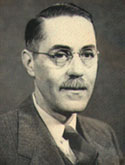Distinguished Faculty AwardTHEODORE TELLEFSEN ODELL '20

THEODORE TELLEFSEN ODELL '20
Professor of Biology
1921-1965
Saturday, May 2, 1998
Theodore Tellefsen Odell, H ’20, was born in Buffalo, New York, in 1896. As an undergraduate, Odell was a member of Phi Beta Kappa, was class historian and in 1935 helped found the Hobart chapter of the Kappa Sigma fraternity. He met Elizabeth E. Herendeen, William Smith ’22 as a student at Hobart, and the couple married after Herendeen graduated. After working one year at a preparatory school, Odell returned to his alma mater for the rest of his career. While teaching full-time, he continued his studies at Cornell, receiving his M.S. in 1927 and his Ph.D. in 1934. He succeeded his teacher and mentor, Professor Elon H. Eaton, as chair of the biology department in 1935, a position he held until his retirement in 1965. He died in 1974.
Professor Odell was strict, but fair. He believed that science majors should be put to the test to determine whether they could meet the exacting standards they would face in their postgraduate education and careers. As a result, professional schools readily accepted the students he recommended. The author of 14 publications, faculty chair of student’s social activities, cross-country coach, and president of the Geneva Board of Education, Odell was also described as a kind and caring person, who remained readily available to his students.
Professor Odell catalogued lake life for the State Conservation Department. He was a devout Episcopalian, warden of the Hobart Chapel, vestryman at St. Peter’s, diocesan delegate, and lay reader in Montour Falls and Phelps. Odell was a member of the Students’ Army Training Corps during World War I, and during World War II, he taught mathematics in the V-12 program. The dedication of the 1966 Echo and Pine aptly stated, “His influence has been felt in nearly every phase of student life and of the Colleges’ development...His patience, sincerity, and willingness to help others can be attested to by many grateful students.”
In his retirement, Professor Odell became curator of the museum in Eaton Hall and was made Professor Emeritus by the Trustees of Hobart and William Smith in 1965. He received an Honorary Doctor of Science degree from the Colleges in 1966. At his retirement, the faculty statement of appreciation read, “To those who came to serve in his department, his devotion to his teaching, to his students, and to his staff, was soon apparent. His total, 24-hour commitment never flagged...His ‘old-school’ approach, his insistence on intellectual discipline, his unusual versatility in the knowledge that he had of a vast and ever-expanding subject area, gave his staff a proper example for emulation. He took an interest in his staff, not just as teachers, but as persons...And many of them - and us - profited from his advice, his direction, his assistance, and his constant kindness.”
Surely, not only faculty, but also generations of students and community members profited from knowing Professor Odell.
